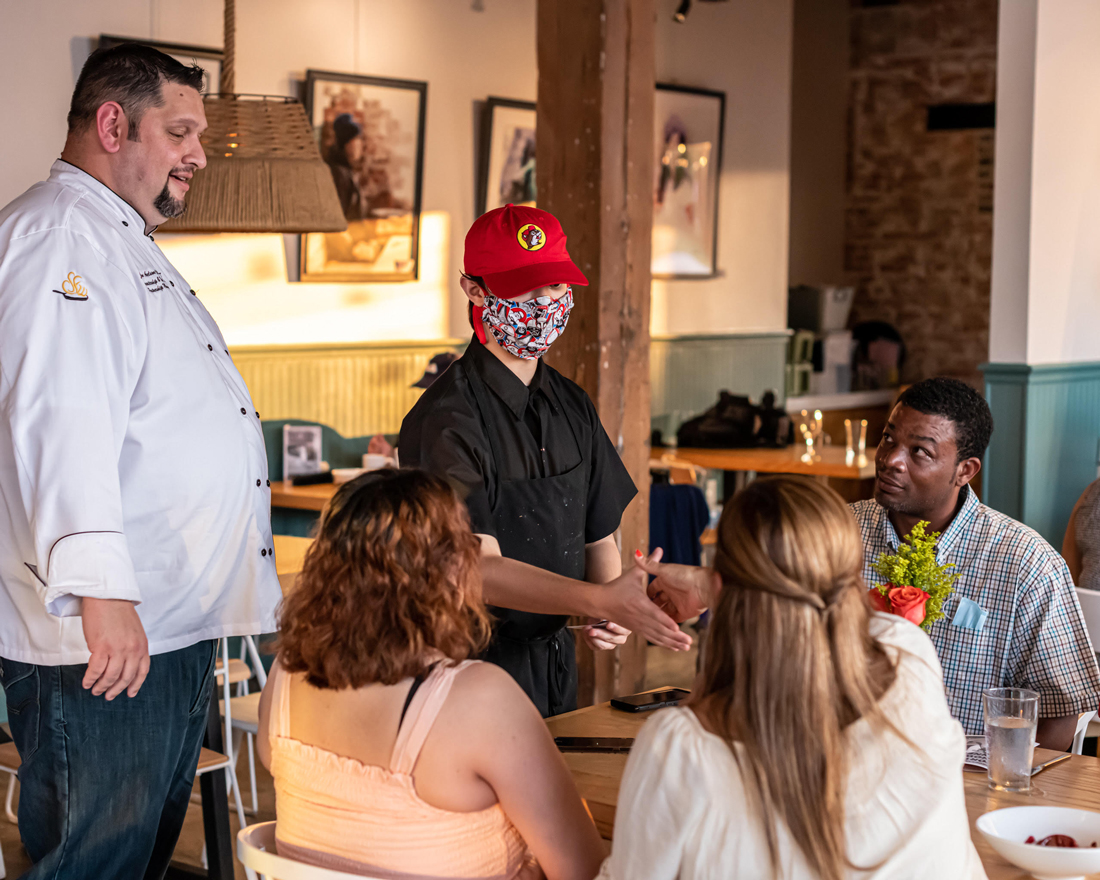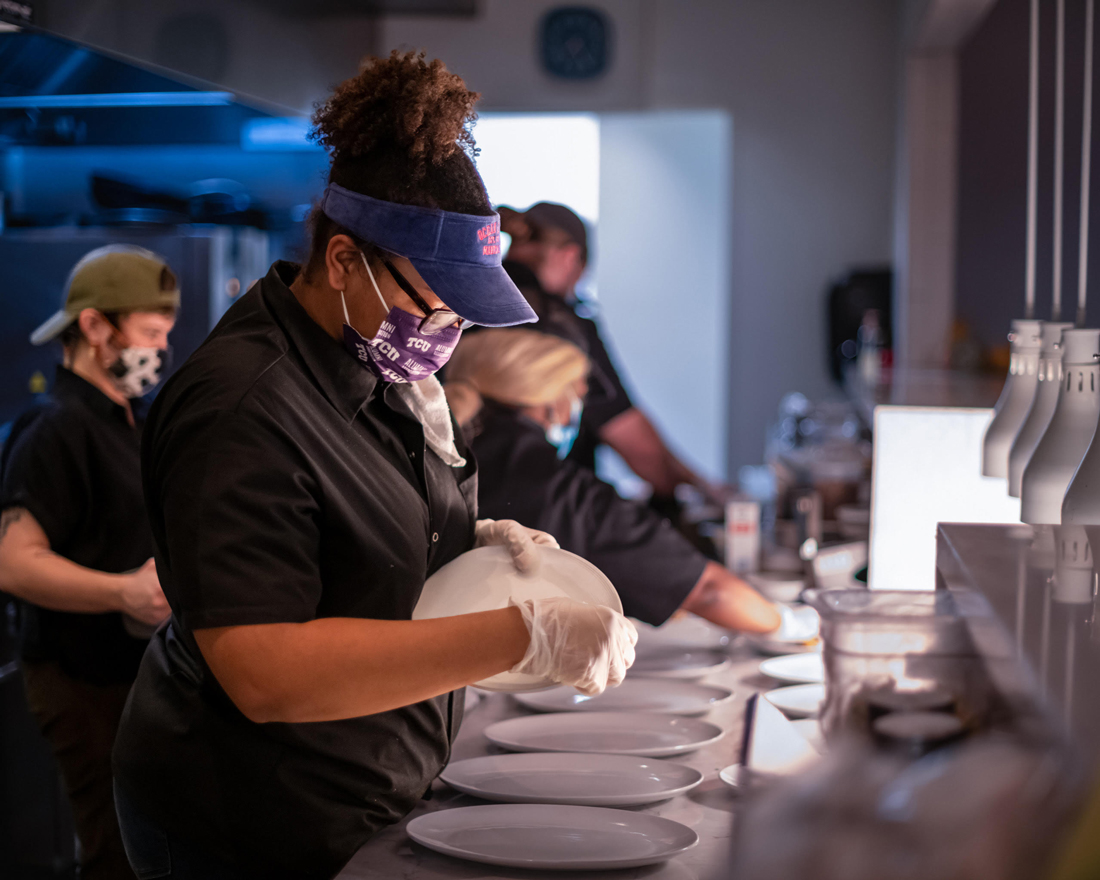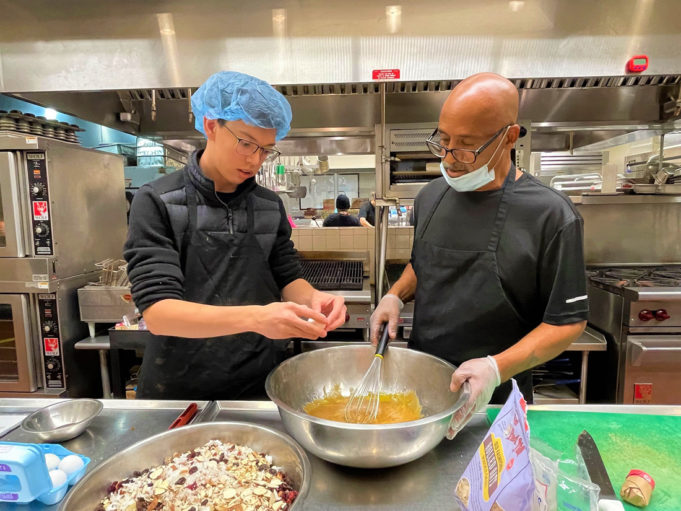Three major Fort Worth institutions have banded together to help aspiring culinary artists enter the workforce. The Tarrant Area Food Bank (TAFB) has partnered with the Culinary School of Fort Worth and the Taste Project to create an accelerated apprenticeship program specifically designed for low-income adults. Through the Fort Worx Collaborative Learning Program, the apprentices can develop the skills necessary for a culinary career.
TAFB’s previous foodservice training program was forced to close when the pandemic hit. Upon reopening in May 2021, they had the opportunity for a fresh approach.
“We wanted to find a way to pay the apprentices as they were going through the training program,” said Julie Butner, TAFB president and CEO. “That was one of the barriers to entry with the last program. You know, it’s an eight-hour-per-day commitment, and if you’re not getting paid during those eight hours, you’re either depending on somebody else or you’re working the second or third shift in order to make ends meet.”
The TAFB asked Workforce Solutions to help support the program financially.

Photo courtesy of Ross Reitzammer.
“We also wanted to have some meat behind it,” Butner said, “so we reached out to the Culinary School of Fort Worth. Through [the school’s] relationship with the American Culinary Federation, we are able to accredit the program and also test the apprentices at the end of their training so that when they leave the program, they walk away with a certified cook certification, to be precise, through the American Culinary Federation, which of course is not only nationally recognized but also internationally recognized. And [apprentices] take that certificate and can carry it with them for the rest of their lives, and if they decide that they’re really interested in culinary arts, they can advance and become a certified sous chef, a certified executive chef, and just keep advancing in the food industry field.”
Through this accreditation, the apprentices have the opportunity to attend any culinary school in the United States that is accredited by the American Culinary Federation (ACF), which is the largest body of its kind in the nation.
The ultimate goal of the program is to identify individuals who have barriers keeping them from finding gainful employment. Through reskilling, the Fort Worx Program is, hopefully, the answer to the call in the community.
“The mission of the project is to target individuals … who, for whatever reason, haven’t found their way into college and haven’t found their way into the workplace,” said Jason Avelson, director of apprenticeship and high school partnerships at the Culinary School of Fort Worth. “It usually results from not having the financial support or even just logistical support to do so. And so they enter sort of this unavoidable lag phase, so the purpose of the program, initially, was just to provide them with the skill set that allows them to enter the workplace and begin earning a meaningful wage.”
Though the Culinary School of Fort Worth interviews prospective students, they do not decide who qualifies for the program. Workforce Solutions is in charge of that.
“The candidates [Workforce Solutions] is sending to us have had barriers to employment,” Butner said, “and that’s who we’re trying to help. Those people who have barriers to employment are the same people who are standing in line to get food from the food bank, so this is an effort to not only feed people who are without means but to, you know, lift them up and get them out of their situations so that they can buy their own food and they don’t have to rely on the food banks for the free food. So that’s the drive for the food bank. We’re very happy to provide food into the community for people who are food insecure, but we also want to lift them out of that food insecurity so they can they have self-sufficiency.”
The program lasts a total of 16 weeks. The first eight weeks consist of an educational portion in which apprentices spend the first half of their day in the classroom and the last half in a mission kitchen producing meals. After the initial eight weeks, the students must pass a written exam and a practical exam to become a certified fundamental cook. Upon passing, they will spend eight weeks working a traditional restaurant schedule at Taste Community Restaurant, where they will advance their skills and learn what it’s like to have a culinary job.
“If it wasn’t for the Fort Worx program, I’d probably be working a crappy job, living paycheck to paycheck, just being miserable,” said Dom Dixon, former apprentice and graduate of the fourth class of the Fort Worx Collaborative Learning Program.
Dixon is now firmly rooted as a saute cook at Fixture on Magnolia and works part-time at Taste Community Restaurant in South Main Village.
Dixon encourages anyone with a desire for cooking to go through the program. “Whatever you don’t know, [the instructors] can help you learn, and whatever you do know, they can help you sharpen and hone.”
The program’s intention is to help build careers.
“The Fort Worx program is very good at foundation building,” Dixon said. “Once you leave the program, that’s where the building blocks come in, and all you can do is go up from there.”
By offering tuition-free, paid work experiences, the program is creating new opportunities for culinary dreamers.
“For a lot of the people who come through this program, this is really the first job that they’ve had,” said Jeff Williams, executive director and founder of the Taste Project.
The students finish their 16 weeks of training with a culminate dinner, where each apprentice is responsible for one aspect of the meal. Potential employers are invited to the dinner to meet prospective employees.
“Pretty much we’ve had every apprentice who finished the program leave the dinner with at least one offer for employment,” Williams said, “sometimes even more than one offer. … That’s just the success of the program.”
The Culinary School of Fort Worth reached out to employer partners and posited a hypothetical: What, if anything, would you offer an individual who underwent eight weeks of culinary training at TAFB that culminated in an ACF certification and then did an externship at a popular, busy local restaurant?
“The response was incredible,” Avelson said.

Photo courtesy of Ross Reitzammer.
Fort Worth employers said they would offer that person $14 to $16 an hour upon hiring.
When asked if he felt like the students enrolled in this project received the same training as a regular enrolled culinary student would, Avelson said they “get a little bit better training. And that seems strange to say … but when we get into a group of five to 10 individuals … there’s just a greater opportunity for individual instruction and attention at each portion of the program.”
The Fort Worx program just started its fifth class, or “cohort,” having achieved its goal in each previous group of apprentices.
“I think it’s been really, really, really successful,” Taste’s Williams said. “We love working with the apprentices. It hits our mission. We’re able to provide them with skills to get employment so that they don’t have the need for the services of the vendor or ourselves anymore … You see their life change. In a short period of time, they’re able to make a big change in their life, and that’s pretty amazing to see.”
The program’s creators want to see growth. Avelson encourages everyone who thinks they might do well in this program to apply. No experience is required, only a passion for food and service.
“I think what we’re learning is, while the focus of the program was initially 18- to 24-year-olds,” Avelson said, “we’ve certainly had clients who were not in that bracket. We’ve had clients from all ages and walks of life. And I think what we want people to know most is that if you think this program will benefit you, if you can see yourself in food service and it’s something that you want to do, or if you say to yourself that this is your way to create a lifestyle in a meaningful way, we want you to apply.”
The Taste Project (1200 S. Main St., 682-233-1255) is hosting an informational session about the Fort Worx Collaborative Learning Program from 6:30 to 7:30pm on Wed., Jan. 19. The program is designed for those who are unemployed, looking for a new skill, or face a barrier to employment.












